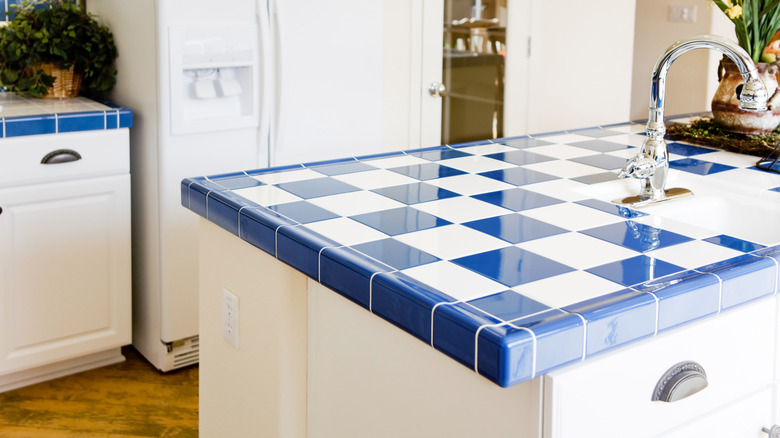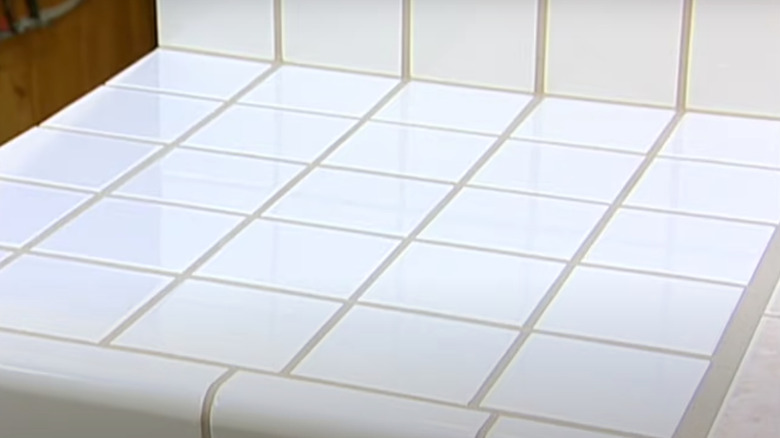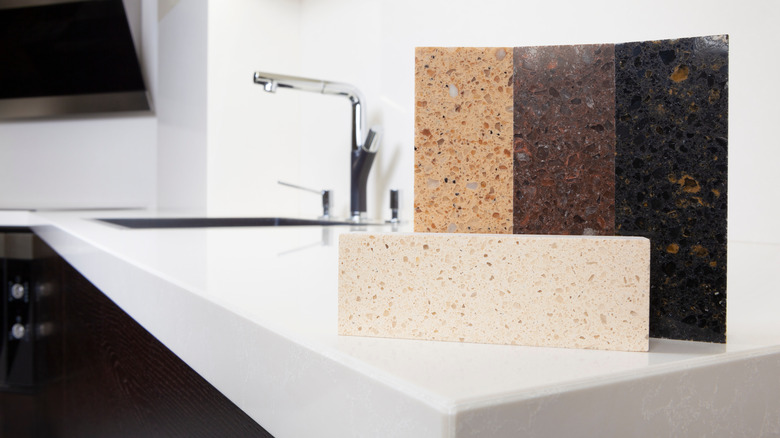The Best Type Of Tile For Your Kitchen Countertops, According To An Expert
When choosing the ideal kitchen countertops, you need to think beyond what just looks appealing and instead focus on how the countertop will hold up in this high-traffic area of the home. That's why it's important to seek the advice of an expert who knows the details of specific materials. "Porcelain tiles are water resistant and durable, and can be relied on for longevity, so they make the best choice," expert Harriet Goodacre at Topps Tiles told Homes & Gardens, "Most porcelain tiles are nano-sealed during manufacturing, meaning their surface is kept protected for longer."
This added protection and the bonus of porcelain tiles not having a porous surface like natural stone or wood can save your kitchen countertops from absorbing cooking stains from oils, wine, or other spillages. This makes cleanup a breeze. Using either a damp cloth or mild detergent, you won't have to worry about lasting damage from making your daily meals. Porcelain tiles also allow you the creativity to come up with a unique design all on your own. Instead of having to choose one basic pattern or style, mix and match from a wide variety of options to come up with a scheme that best fits in with your overall aesthetic. This durable material stands up well to higher temperatures, in case you have a hot pot you need to set down; plus, it can generally withstand scratches, although you shouldn't rely solely on the surface if you are chopping and dicing.
Ceramic tiles can also be perfect for your kitchen counters
If you are seeking out a very affordable option to tile your kitchen countertops that offers the same quality and durability as other options, then ceramic tiles could be your best bet. Made of porous clay that has been pressed and then styled and colored to fit all kinds of patterns, ceramic tiles become hardened and water-resistant after they have been glazed. This protective glaze helps to prevent unsightly stains or burns from extreme heat from pots or pans. It's important to stay away from natural stone ceramic tiles as the porous texture needs to be regularly sealed; otherwise, they actually absorb these stain-causing liquids.
Although installation can be simple and done either by a professional or as your own DIY project, it does require a fair bit of planning and care as you want to ensure that the placement is even and level. When it comes to deciding between porcelain and ceramic tiles, the major difference will be in the cost and how easily each is to work with. On average, ceramic tiles are around 30% cheaper than porcelain tiles. So if you have a larger project, ceramic could be a more cost-effective material to use. Also, if you are planning to do the project yourself, ceramic could be easier to cut as it is not as tough as its porcelain counterpart.
Why choose tile countertops instead of granite or wood
Whether thinking of tiles, granite, natural stone, or wooden butcher block, you may find the variety of kitchen countertop choices a little overwhelming. However, there are plenty of positives to switching to a tiled countertop which may make your decision a little easier. They're more affordable than spending big bucks on bulky custom-cut granite pieces and are also be found in a huge selection of patterns and colors. This allows you the freedom to play with different styles instead of committing to one solid design, like with stone or wood counters. There is also the bonus of easily fixing the counter if one or two tiles happen to get damaged. Instead of the whole countertop being devastated by a crack, you can simply remove the broken tile and replace it with another.
Tile counters are also easy to clean with household or natural cleaners and do not need much additional protection. The grout in between the tiles can be cleaned with a mixture of vinegar and baking soda, but with normal care, it should last a great deal of time. Whereas wooden butcher block countertops could require regular treatment with beeswax or another sealant to keep them from becoming ruined by normal wear and tear. Although tiled kitchen counters may not be for everyone, especially if you prefer a flat, uniform cooking surface, they could add some much-needed pizzazz and style to the heart of your home.


